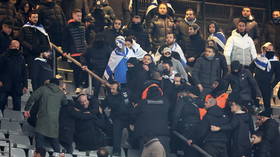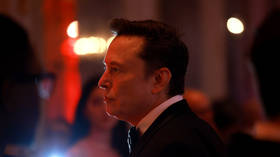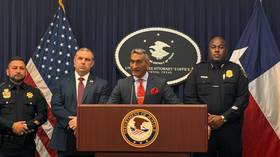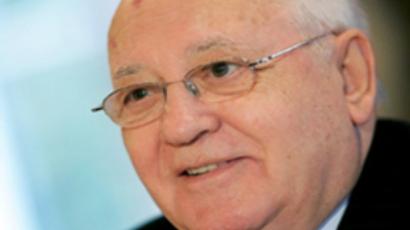Thursday's Press Review
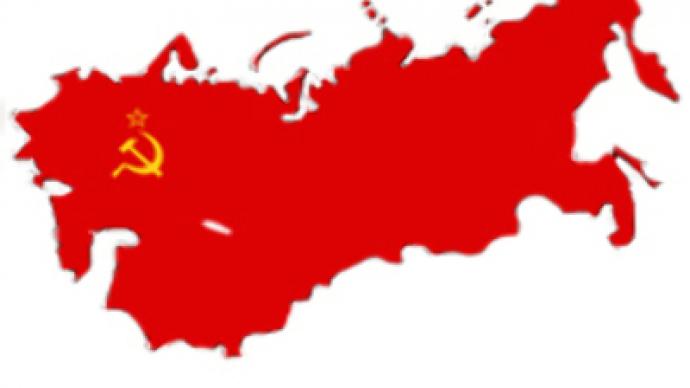
This Thursday Russian newspapers publish a Russian MP’s view on NATO and ‘the Russian threat’, a German Foreign minister’s view on Helsinki, a U.S. Ambassador’s view on Russia-U.S. cooperation against HIV/AIDS and a Russian academic’s view of the future o
ROSSIYSKAYA GAZETA has an article by the Chairman of the State Duma’s International affairs committee, Konstantin Kosachev. He writes that it was already evident during the Bucharest NATO summit in April that Georgia and Ukraine count on the ‘Russian threat’ for facilitating their admission into the North-Atlantic alliance. Georgia, writes the parliamentarian, tried hard to escalate its conflict with Russia in every sphere where it was possible, however Russia never yielded to the temptation of a ‘tough response.’
It left Georgia with one and only option, he continues, that option being an open armed confrontation. The idea was to demonstrate to the West that the Russian threat is real and the only way for both countries (and it is no secret that Ukraine helped Georgia prepare for the military provocation) to be saved from ‘Russian imperialism’ is for them to be accepted into NATO as soon as possible.
The Russian response, says Kosachev, was tough but precise: Russia showed the whole world that it is always ready to protect its citizens but also demonstrated quite clearly the total lack of intention to change the regime in Georgia. Even if right after the conflict an anti-Russian sentiment was predominant in the West, writes the politician, when the dust finally settled, the picture that emerged was not of a Russian attack on Georgia but of a Georgian aggression, and that picture remained as part of public opinion.
Later the financial crisis created a situation when most NATO member nations became busy with their anti-crisis programs, says Kosachev, and that caused a degree of indifference to Georgia and Ukraine’s plans for NATO membership. As a matter of fact, he continues, Russia itself became indifferent to the continuing provocations from Tbilisi and Kiev.
All that combined has contributed to the cold shoulder treatment extended to Georgia and Ukraine at the Brussels NATO summit this week, concludes the parliamentarian. As for the ‘Russian threat,’ he says, it has the potential of dissolving into thin air in the next few months, especially with the initiative of President Medvedev on a new system of security for Europe being discussed in Helsinki. This initiative, in fact, doesn’t leave much space for NATO to expand into.
IZVESTIA publishes an article by the German Foreign minister, Frank-Walter Steinmeier, who writes that with the meeting of foreign ministers of OSCE member states in Helsinki the process of European security ‘is returning to its roots.’ He says in the past that process helped overcome the confrontation between NATO and the Warsaw Pact. Later it led to the Paris charter adopted for the new, post-Cold War Europe. Today, continues the minister, we know that we are still far from the ‘new epoch of democracy, peace and unity’ hailed in the Paris charter.
He says rhetoric of confrontation is again in use, together with Cold War thinking. The minister writes that the only thing that remains unchanged is the fact that if we act against each other, there will never be security and stability in our common European home. Every challenge of our times: not only terrorism but the financial crisis and all other problems requires closest cooperation of all nations participating in the OSCE. The German Foreign minister also says that the EU, NATO and the OSCE are three cornerstones of European security. However, he writes, for NATO ‘we need a principle understanding of the path of its further movement.’
The minister says an honest exchange of opinions on NATO is long overdue, postponed in favour of NATO expansion. The minister also says that positive signals for new developments in the system of European security have been received both from the U.S. president-elect Barack Obama and the Russian President Dmitry Medvedev. That, he writes, feeds the hopes of a better future for Europe and the World.
NEZAVISIMAYA GAZETA comments on the Helsinki meeting, saying that while differences in the understanding of the situation around Georgia may not allow the participants to adopt a joint final document, President Dmitry Medvedev’s initiative about a new security system for Europe will, most probably, become the main topic of discussion. The paper also notes the absence of the U.S. Secretary of state Condoleezza Rice at the meeting.
Russian diplomats are quoted by the paper as saying unofficially that Ms Rice decided not to show up in Helsinki because of her position on the Medvedev initiative: she thinks that the plan suggested by the Russian President goes straight against the NATO-centric system that exists at the moment.
The same paper publishes an article by the U.S. Ambassador to Russia, John Bayerly. He writes about the U.S.-Russia cooperation against HIV/AIDS, calling it a ‘partnership in saving lives.’ The Ambassador says that Russia and the U.S. together are doing their significant part in the fight against the most deadly disease of the 21st Century. He says the U.S. is proud to work together with Russia in this sphere – in Russia itself, as well as internationally.
VREMYA NOVOSTEI has an article by Konstantin Asmolov of the Centre for Korean Studies of the Institute of the Far East, Russian Academy of Sciences. He writes that the rumours about the ailing health of the North Korean leader Kim Jong-il cause analysts all over the world to imagine scenarios of the future of North Korea in case of his abrupt withdrawal from leadership. The academic says that, if Kim Jong-il dies one of these days, it would not mean the end of problems on the Korean peninsula, but the very beginning. For Russia, he says, neither of the possible scenarios is positive. If North Korea falls entirely under direct Chinese domination, that would threaten Japan, the U.S. will get involved and the overall situation will be threatening to the Russian Far East.
If civil war erupts there, South Korea will be threatened and U.S. and South Korean troops may enter the North for an Iraq-like operation, and get stuck there permanently. That, says the academic, also does not augur well for the Russian Federation’s Eastern-most region.
A fast reunification of two Koreas based on the example of Germany will cause a huge drop in living standards, as the means necessary for the unification exceed the national budget of South Korea by 150%. He says social unrest and the spread of North Korean organised crime around Asia may become direct results of the reunification. Again, Russia is going to suffer most: from a crime wave and from the influx of refugees. Under such conditions, writes the academic, the best thing for Russia now is to wish the North Korean leader a long and healthy life.
And, finally, from IZVESTIA – the exclusive quotes from Mikhail Gorbachev I promised yesterday but failed to publish due to my own very human error:
‘I still regret it today – I shouldn’t have left (Foros). That was a mistake. Another mistake was that I hadn’t sent Yeltsin forever to some distant country to oversee the manufacture and supply of banana-based products… When the (Central Committee) Plenum demanded to expel him from the Committee. Some even wanted to expel him from the party for what he was planning then.’
‘We all, together, made three more mistakes. We were late with the party reform. Late with the reform of the (Soviet) Union (as a state). The third mistake – when the whole nation ended up queuing (for food and essentials) we should have found an extra 10 – 15 billion dollars. We could find them. Because the defence expenditure was 106 billion, not the figures that we made public. 10 – 15 billion more – nothing bad would have happened to us if we spent them (on the essentials). That question was discussed at the Politburo, opinions split. There were those who insisted. But Nikolay Ryzhkov was against it. I trusted him. I supported him in everything. And I supported him in this particular case. While in fact, we should have done it.’
Evgeny Belenkiy, RT



